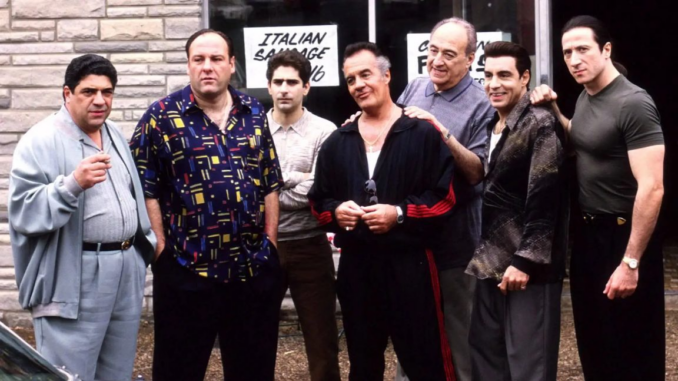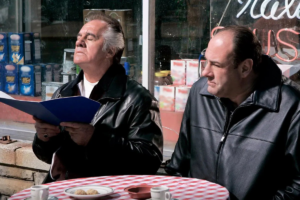
Introduction: The Mysterious Connection Between James Gandolfini and the Mob
When you think of James Gandolfini, the first thing that comes to mind is likely his portrayal of Tony Soprano—the morally complex, larger-than-life mob boss who became a cultural icon on HBO’s ‘The Sopranos’. But did you know there’s an intriguing real-life twist to Gandolfini’s career that many fans don’t know about? According to various sources, the mob reached out to Gandolfini about the role of Tony Soprano before he even got the part.
This connection between the actor and the real-life mob gives the show an added layer of authenticity, making the iconic role even more fascinating. In this article, we’re diving deep into the surprising tale of how the mob’s involvement with Gandolfini shaped ‘The Sopranos’ and how it influenced the portrayal of one of TV’s greatest characters.
How the Mob Reached Out to James Gandolfini: The Shocking Connection
The Role of Tony Soprano: A Mobster’s Dream
Before James Gandolfini was cast in ‘The Sopranos’, the role of Tony Soprano was a highly coveted part. The show’s creator, David Chase, envisioned a character that would be both a ruthless mafia boss and a deeply vulnerable, relatable person. To make this vision a reality, he needed an actor who could balance Tony’s violent nature with his emotional turmoil.

Gandolfini’s audition for the role was legendary. But what many don’t know is that the real-life mob seemed to have noticed Gandolfini’s suitability for the part, long before his casting was finalized.
A Call from the Mob: The Mob’s Interest in Gandolfini
According to various accounts, the mob reached out to James Gandolfini after seeing his potential to accurately portray a mob boss. It’s not uncommon for organized crime figures to have their eyes on Hollywood, especially when it comes to portraying mafia life. The mafia often has an interest in how they are represented in the media, and sometimes even influence the way mob-related characters are portrayed.
Reports suggest that members of the mob actually reached out to Gandolfini with words of encouragement before he officially signed on for the role of Tony Soprano. They saw in him the same strength and demeanor that they believed reflected the real-life figures who dominated the underworld.
The Mob’s Approval: A Double-Edged Sword
While the mob’s acknowledgment may have given Gandolfini confidence in his role, it also added pressure. The Sopranos was groundbreaking in its portrayal of mafia culture, and having the mob’s seal of approval could be both a blessing and a curse. The actors and creators of the show would need to be cautious of the balance between fictionalized mafia life and reality.
The Impact of the Mob’s Involvement on ‘The Sopranos’
Authenticity and Realism: How the Mob’s Influence Shaped the Show
One of the defining qualities of ‘The Sopranos’ was its authentic portrayal of mafia life. The series didn’t sugarcoat the violent reality of organized crime, nor did it glamorize the characters. This realistic depiction of the mob was one of the reasons why the show became so successful—and the mob’s influence played a role in ensuring the authenticity of Tony Soprano’s character.
Gandolfini’s performance as Tony Soprano reflected that authenticity. He wasn’t just playing a stereotypical mafia boss; he was portraying a complex man struggling with personal and professional challenges. The mob’s influence on Gandolfini’s portrayal helped shape Tony as someone who was grounded in realism.
The Mob and the Show’s Writing: An Unspoken Partnership
Many of the show’s storylines were drawn from real-life experiences and influenced by the people behind organized crime. Even though the show’s creators were careful not to depict real-life mafia figures, they used aspects of mafia culture that had been discussed with people from the underworld. These subtle contributions added depth and credibility to the show’s portrayal of mob life.
James Gandolfini: A Role Built from Real-Life Inspiration
Gandolfini’s Natural Fit for Tony Soprano
James Gandolfini’s portrayal of Tony Soprano was more than just acting—it was a masterful blend of art and authenticity. The mob’s involvement played a role in reinforcing Gandolfini’s understanding of how a mob boss should behave. The actor drew from his own life experiences and conversations with people in the industry to bring Tony Soprano to life.
Gandolfini’s connection to the mob and the deep dive into mafia culture helped him understand Tony’s psychological complexities. Unlike other depictions of mobsters, Tony Soprano was shown as a man trying to balance his role as a father, husband, and crime boss. This multi-layered portrayal was groundbreaking and added a dimension of humanity that made ‘The Sopranos’ unlike anything that had come before it.
The Mob’s Influence on Gandolfini’s Method Acting Approach
Gandolfini was known for his method acting, and the influence of real-life mob figures helped him craft Tony’s demeanor and emotional depth. Gandolfini spoke about his interactions with mobsters, noting how they helped him understand the psychology behind a person like Tony, who was caught between his violent nature and emotional struggles.
The Lasting Legacy: The Mob’s Role in Shaping Tony Soprano’s Iconic Status
Tony Soprano: A Cultural Icon with Real-Life Roots
Tony Soprano became a pop culture icon, influencing not just television but also the way we think about mobsters in media. His character transcended the typical mafia boss role and offered viewers a complicated look at crime, family, and mental health. The mob’s involvement in shaping Tony’s character brought a level of realism that contributed to the show’s immense success.
Fans continue to celebrate ‘The Sopranos’, often referencing Tony Soprano’s iconic moments, from his therapy sessions to his family struggles. His character remains one of the greatest in television history, largely due to Gandolfini’s nuanced portrayal, which was deeply influenced by his interactions with real-life figures connected to the mafia.
Conclusion: How the Mob’s Influence Contributed to the Legacy of ‘The Sopranos’
In conclusion, the mob’s involvement in the creation of Tony Soprano’s character added an intriguing layer of authenticity to ‘The Sopranos’. While it might seem surreal that mobsters reached out to James Gandolfini, this interaction helped bring the character of Tony to life in a way that no other mob boss on television had before. ‘The Sopranos’ was groundbreaking not only because of its unique narrative and compelling characters but also due to the real-world influence that the mafia had on its creation.
The combination of Gandolfini’s incredible acting, the writers’ bold storytelling, and the authenticity inspired by the mob created a show that continues to be revered as one of the greatest of all time. As Tony Soprano remains etched in the cultural zeitgeist, we can only imagine what other behind-the-scenes stories are yet to be told.
FAQs
1. How did the mob influence ‘The Sopranos’? The mob’s involvement helped bring an authentic, realistic portrayal of mafia life to the show. Some real-life mobsters even reached out to James Gandolfini to encourage his portrayal of Tony Soprano, adding layers of credibility to the character.
2. Was James Gandolfini’s portrayal of Tony Soprano based on real-life mobsters? While Tony Soprano was a fictional character, Gandolfini’s portrayal was influenced by his interactions with real-life mobsters. These encounters helped him understand the psychological and emotional complexities of a mafia boss.
3. How did the mob react to ‘The Sopranos’? The mob was generally pleased with how the show portrayed mafia life, with some members reaching out to Gandolfini to express approval of his performance as Tony Soprano.
4. What impact did ‘The Sopranos’ have on television? ‘The Sopranos’ revolutionized television by blending complex characters, long-form storytelling, and real-world authenticity. The show paved the way for a new era of TV that focuses on morally ambiguous characters and deep psychological exploration.
5. Why is Tony Soprano considered an iconic character? Tony Soprano’s character is iconic due to his complexity, depth, and vulnerability. He was more than just a typical mob boss; he was a family man, a businessman, and a person grappling with his own mental health, making him relatable to